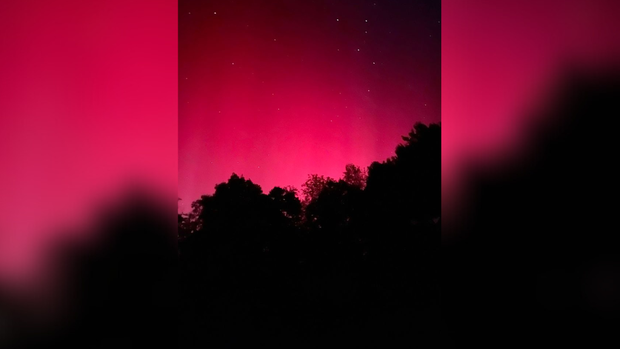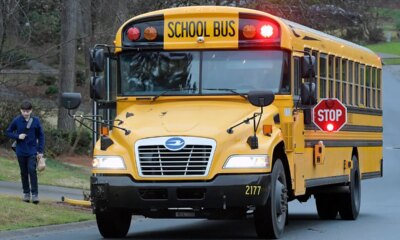Pennsylvania
Photos show northern lights and Perseid meteor shower in Western Pennsylvania

The northern lights were captured in Rural Valley, Armstrong County, on Aug. 12, 2024.
Northern lights on Aug.12
The northern lights were spotted in Claysville, Washington County, on Aug. 12, 2024.
Northern lights on Aug.12
The northern lights were captured in Rural Valley, Armstrong County, on Aug. 12, 2024.
Northern lights on Aug.12
The northern lights and a shooting star were spotted in Butler County on Aug. 12, 2024.
Northern lights on Aug.12
The northern lights were captured in Rural Valley, Armstrong County, on Aug. 12, 2024.
Northern lights on Aug.12
The northern lights were captured in Rural Valley, Armstrong County, on Aug. 12, 2024.
Northern lights on Aug.12
The northern lights were spotted in Claysville, Washington County, on Aug. 12, 2024.

Pennsylvania
Pa. man found guilty of raping teen girl who he took to Mexico

A Pennsylvania man was found guilty of repeatedly raping his daughter’s best friend over a three-year span before fleeing with the teen to Mexico.
On Thursday, March 5, 2026, Kevin Esterly, 53, of Whitehall Township, Pennsylvania, was convicted on all counts of rape, statutory sexual assault, involuntary sexual intercourse and endangering the welfare of children.
Esterly shook his head as the verdict was read but said nothing in the courtroom.
Resources for victims of sexual assault are available through the National Sexual Violence Resources Center and the National Sexual Assault Telephone Hotline at 800-656-4673.
Esterly’s trial began on Tuesday, March 3, after a judge denied his pretrial motion for the charges against him to be dismissed and for the Lehigh County District Attorney to be removed as a prosecutor in the case.
Both Esterly and his victim testified on Wednesday, March 4.
The victim — who is now 24-years-old — told the courtroom that she met Esterly and his family while attending church as a child and became best friends with one of his daughters. Esterly was a youth leader and elder at the church at the time. The victim said Esterly also coached her soccer team.
The victim said she became so close to Esterly’s family that she called his wife “mom” and eventually spent almost every weekend at their home in Lowhill Township, Pennsylvania. She also said she vacationed with them in New York state and Ocean City, Maryland.
The victim said Esterly first sexually assaulted her in August 2015 when she was 13-years-old after he gave her alcohol during a family birthday party.
“I was scared. Frozen in fear,” the woman told the courtroom on Wednesday. “I pretended I was sleeping.”
The woman accused Esterly of sexually assaulting her almost every time she slept over at his home. She told the courtroom she eventually became addicted to alcohol and drugs, which Esterly gave her in exchange for sex. According to the woman, Esterly gave her cocaine and methamphetamine to keep her awake during school because she “would be up with him all night.”
The woman said Esterly continued to sexually assault her until he was confronted by his wife in 2017. Esterly’s wife then threw him out of the house, according to the victim. She said Esterly continued to sexually assault her over the next year.
Esterly was later arrested and then sentenced to prison after federal agents found him with the victim in Playa del Carmen, Mexico, in 2018. She was 16-years-old at the time.
The woman said she moved on and went to college after Esterly’s sentencing though she still struggled with drug addiction. She said she sought counseling in February 2025. She told the courtroom she received a message from Esterly on LinkedIn that same month in which he apologized for “failing you as a person I was supposed to be for you.” At that point Esterly had been released from prison.
The woman said she had not told anyone about her relationship with Esterly up to that point and replied to him, “I live with our secret every day as I promised. I would appreciate an apology.”
The woman told the courtroom that Esterly responded by writing, “I hope one day you can forgive me. Nobody knows I reached out to you. That is the best for both of us.”
On Feb. 21, 2025, Allentown Police received a report of Esterly’s sexual assaults which led to the new charges being filed against him. He was arrested in West Virginia in June 2025 after two police pursuits. He was then extradited to Pennsylvania.
The victim told the courtroom on Wednesday that she kept quiet about Esterly’s abuse for years because she “was afraid to speak,” and felt “dirty and ashamed.”
“I wasn’t ready to tell anyone,” she said. “He was a father figure in my life. I loved him.”
The woman also said she didn’t want to hurt Esterly’s daughter who was her best friend.
When the District Attorney asked her why she was “here today,” she replied by saying, “I want to tell the truth. I want to be set free.”
The woman ended her testimony by saying, “I don’t want to live with this secret anymore.”
After her testimony, Esterly took the stand for 45 minutes, denied all of the accusations against him and accused the woman of lying.
Closing arguments then took place Thursday morning. It then took an hour for the jury of seven women and five men to reach their verdict.
Pennsylvania
3 dead in apparent murder-suicide spanning from Pennsylvania to Illinois, police say

Two women are dead in Pennsylvania and a man is dead in Illinois after an apparent murder-suicide, police said on Wednesday.
According to a report from the Pennsylvania State Police, the investigation began in Hillside, Illinois, when police there were dispatched after a man reported two women dead in Jackson Township, Pennsylvania. Police said that when officers got to Hillside, about 15 miles west of Chicago, they found that the man had died from a self-inflicted gunshot wound.
After identifying him, troopers said Hillside officers contacted police from Jackson Township to request a welfare check at the man’s home on Dior Drive, about 30 miles north of Pittsburgh.
Police said officers used forced entry to get into the home and found two women dead from apparent gunshot wounds. It’s believed the two women were family members of the man who died by suicide in Illinois, investigators said.
Pennsylvania State Police said they’ve assumed control of the case and are “actively investigating” what happened surrounding the three deaths.
Police didn’t release any names, saying the process of formal identification and notification of next of kin hasn’t been completed. Sources told KDKA that the victims were a husband, wife and their daughter.
“At this time, investigators believe there is no ongoing threat to the public, and law enforcement is not searching for any additional individuals in connection with this incident,” police wrote in the public information release report. “This remains an active and ongoing investigation.”
State police didn’t release any other details on Wednesday but said more information will be made public when it’s available.
“My first reaction was shocked because this is such a close-knit neighborhood, and to think something that horrible could happen here is very tragic because they were such a good family,” neighbor Danielle Sporer said on Wednesday.
Pennsylvania
Top Pennsylvania 2027 quarterback enrolls into Coatesville (Pa.)

One of the top 2027 Pennsylvania high school quarterbacks from the 2025 season has announced that he’s leaving for a new home.
Per an announcement by Class of 2027 signal caller Mikal Shank Jr., the quarterback has left Harrisburg (Pa.) and is now at Coatesville (Pa.) for his senior season. Shank Jr. last season started 14 games for the Cougars and is arguably one of the state’s top returning players behind center heading into the 2026 campaign.
Per a PennLive report, Shank’s mother said the enrollment to Coatesville was due to “employment relocation.”
Advertisement
With Shank now leaving Harrisburg, the Cougars lose another piece of the starting offense from 2025 as the team is set to graduate running back Messiah Mickens (Virginia Tech enrollee), wide receiver Elias Coke (Rutgers enrollee) and interior offensive lineman Kevin Brown (West Virginia enrollee).
Shank last season through 14 games completed 191 of 280 passes for 2,505 yards and 24 touchdowns. The Cougars made a deep playoff run in the PIAA playoffs, finishing the season at 13-1 and ranked No. 10 according to the final Pennsylvania 2025 High School Football Massey Rankings.
Coatesville went 10-3 last season and finished as the state’s No. 30 ranked team, according to the final Pennsylvania 2025 High School Football Massey Rankings. The Red Raiders bring back 2027 5-Star Plus offensive lineman Maxwell Hiller to the trenches.
More about Coatesville High School
Coatesville Area High School (CASH) serves as the central high school for the Coatesville Area School District in Pennsylvania. Established in the late 1800s and relocated to its current campus in 1968, it features extensive facilities, including a football stadium and a vocational center. Known for its “Red Raiders” athletics teams, CASH provides students with a robust sports program and extracurricular activities that build school spirit and community engagement.
Advertisement
How to Follow Pennsylvania High School Football
For Pennsylvania high school football fans looking to keep up with scores around the Keystone State, staying updated on the action is now easier than ever with the Rivals High School Scoreboard. This comprehensive resource provides real-time updates and final scores from across the state, ensuring you never miss a moment of the Friday night frenzy. From nail-biting finishes to dominant performances, the Rivals High School Scoreboard is your one-stop destination for tracking all the Pennsylvania high school football excitement across the state.
-

 World1 week ago
World1 week agoExclusive: DeepSeek withholds latest AI model from US chipmakers including Nvidia, sources say
-

 Wisconsin4 days ago
Wisconsin4 days agoSetting sail on iceboats across a frozen lake in Wisconsin
-

 Massachusetts1 week ago
Massachusetts1 week agoMother and daughter injured in Taunton house explosion
-

 Maryland5 days ago
Maryland5 days agoAM showers Sunday in Maryland
-

 Massachusetts3 days ago
Massachusetts3 days agoMassachusetts man awaits word from family in Iran after attacks
-

 Florida5 days ago
Florida5 days agoFlorida man rescued after being stuck in shoulder-deep mud for days
-

 Denver, CO1 week ago
Denver, CO1 week ago10 acres charred, 5 injured in Thornton grass fire, evacuation orders lifted
-

 Oregon6 days ago
Oregon6 days ago2026 OSAA Oregon Wrestling State Championship Results And Brackets – FloWrestling






























